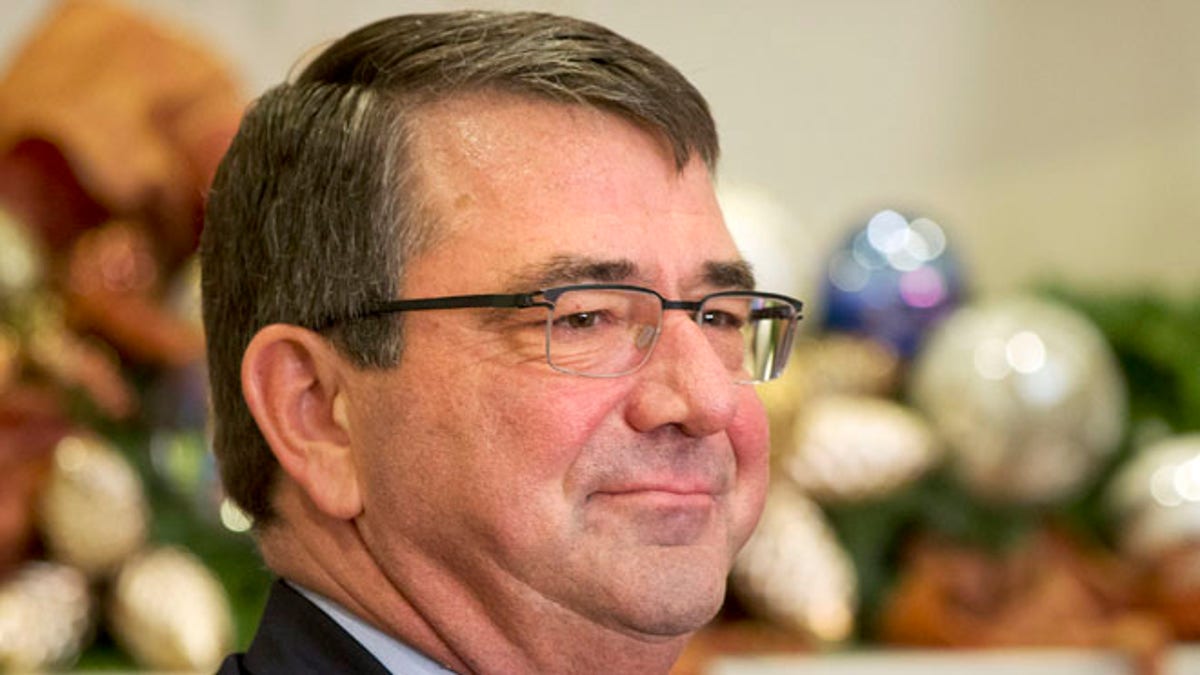
FILE: Dec. 5, 2014: Ashton Carter listen as President Obama announces him as his nominee to be Defense secretary, Roosevelt Room of the White House, Washington, D.C. (AP)
The new leader of America's military admitted it was a "mistake" for an officer to have "blurted out" plans for an Iraqi-led ground offensive in Mosul during a recent media briefing.
That highly unusual briefing, in which an officer revealed the U.S. wanted the Iraqis to launch the offensive to retake Mosul from the Islamic State in April or May, raised concerns over the level of detail provided -- and also was criticized as giving inaccurate information.
Defense Secretary Ash Carter, testifying Tuesday on Capitol Hill, said the information should not have been provided, accurate or not.
"That clearly was neither accurate information, nor had it been accurate would it have been information that should be blurted out to the press," Carter told the Senate Armed Services Committee. "So it's wrong on both ... scores."
Carter said it's important to be open, but "not with military secrets and not with war plans, which is the mistake here."
The briefer, whose presentation for reporters at the Pentagon on Feb. 19 was authorized by U.S. Central Command, predicted a spring offensive, though acknowledged it might go later, and gave other information about the military plans.
Lawmakers quickly questioned the decision to release these details. But the details themselves also were challenged.
Director of National Intelligence James Clapper last week predicted it would take longer for the Iraqis to be ready. The Daily Beast then reported that the U.S. military's goal of retaking Mosul from ISIS had been pushed back several months.
It now indeed appears likely that the offensive will not begin this spring, with Iraq's security forces requiring more time for U.S.-organized training.
Islamic State fighters overran Mosul last June. Iraqi government forces folded quickly, leading to the start of a U.S.-led bombing campaign in Iraq in August.
Army Gen. Martin Dempsey, chairman of the Joint Chiefs of Staff, who was testifying alongside Carter on Tuesday, said he had discussed the Mosul briefing with Gen. Lloyd Austin, head of Central Command.
"He's conducting an internal inquiry," Dempsey said, adding that he is confident Austin will "take the appropriate action." He did not say what that might be.
The briefing was done by an officer at Central Command headquarters in Tampa, Florida. He spoke by phone to a group of reporters in the Pentagon on condition of anonymity under ground rules set by Central Command.
The episode was remarkable in at least two respects. It was unusual for the U.S. military to disclose in advance the expected timing of an offensive as well as details about the makeup of the Iraqi force that would undertake it. And it was curious that a secretary of defense would wait nearly two weeks after such a briefing to denounce it publicly for having spilled military secrets.
Asked about it by reporters twice last weekend, Carter was more circumspect.
"The important thing is that it will get done when it can be done successfully," he said last Friday, referring to the Mosul offensive. "And even if I knew exactly when that was going to be, I wouldn't tell you." Asked to comment again the following day, Carter said it's important to keep the public informed, "consistent with security and other considerations."
On Tuesday he was more pointed and expansive in directly criticizing Central Command.
The Associated Press contributed to this report.




